- News
- Reviews
- Bikes
- Accessories
- Accessories - misc
- Computer mounts
- Bags
- Bar ends
- Bike bags & cases
- Bottle cages
- Bottles
- Cameras
- Car racks
- Child seats
- Computers
- Glasses
- GPS units
- Helmets
- Lights - front
- Lights - rear
- Lights - sets
- Locks
- Mirrors
- Mudguards
- Racks
- Pumps & CO2 inflators
- Puncture kits
- Reflectives
- Smart watches
- Stands and racks
- Trailers
- Clothing
- Components
- Bar tape & grips
- Bottom brackets
- Brake & gear cables
- Brake & STI levers
- Brake pads & spares
- Brakes
- Cassettes & freewheels
- Chains
- Chainsets & chainrings
- Derailleurs - front
- Derailleurs - rear
- Forks
- Gear levers & shifters
- Groupsets
- Handlebars & extensions
- Headsets
- Hubs
- Inner tubes
- Pedals
- Quick releases & skewers
- Saddles
- Seatposts
- Stems
- Wheels
- Tyres
- Health, fitness and nutrition
- Tools and workshop
- Miscellaneous
- Buyers Guides
- Features
- Forum
- Recommends
- Podcast
review
£169.99
VERDICT:
Effective bump-taming suspension stem as long as you don't mind the added weight
20mm of travel eases the impacts on your wrists
Plenty of adjustability
Weighty
Can bottom out if you ride aggressively
Weight:
495g
Contact:
At road.cc every product is thoroughly tested for as long as it takes to get a proper insight into how well it works. Our reviewers are experienced cyclists that we trust to be objective. While we strive to ensure that opinions expressed are backed up by facts, reviews are by their nature an informed opinion, not a definitive verdict. We don't intentionally try to break anything (except locks) but we do try to look for weak points in any design. The overall score is not just an average of the other scores: it reflects both a product's function and value – with value determined by how a product compares with items of similar spec, quality, and price.
What the road.cc scores meanGood scores are more common than bad, because fortunately good products are more common than bad.
- Exceptional
- Excellent
- Very Good
- Good
- Quite good
- Average
- Not so good
- Poor
- Bad
- Appalling
It takes a bit of getting used to, but spend time with the Kinekt Suspension Stem and it brings some welcome relief on rough roads and tracks, especially if the distances you like to ride are on the long side. Weight weenies may baulk at the weight, though.
While you can tame the ride comfort of your gravel bike by tweaking the tyre pressures, sometimes that's not enough, which is where the Kinekt comes in.
> Find your nearest dealer here
Its parallelogram, spring-damped design allows around 20mm of travel, and although it won't take the sting out of larger impacts it does a good job of taming high-frequency vibrations and smaller jolts.
The Kinekt comes with three different springs: soft, medium and firm. The medium is fitted as standard as this is the one Kinekt believes will correspond with the majority of people's weight and riding styles.
I found it a little on the spongy side, and it bottomed out easily which soon became annoying. A lot of this I put down to the fact that I have quite a large drop from my saddle to the handlebar, which puts extra weight on my wrists.
Installing the firmer spring (which was very simple thanks to the included instructions – all you need is a 2.5mm hex key) gave much smoother and progressive damping.
It can feel a little weird at first until you get used to the movement, but it soon becomes normal, and with the firmer spring rate there is minimal 'bob' when riding on smooth tarmac or when you are out of the saddle.
When braking hard on steep, rough descents the suspension effect lets you keep a firmer grip on the levers, which is a big bonus.
Overall, I did notice benefits to wrist and shoulder comfort – not so much on shorter rides of a couple of hours, more when I was out for four or five hours at a time. I think this is when I'd look to fit the Kinekt, for those longer jaunts – with all the frame bags mounted, the extra weight of the stem would be less noticeable too. For short, fast rides I'd just stick with the standard rigid one.
The Kinekt comes in 90mm, 100mm, 105mm and 120mm lengths, with an option of either a 7 degree or 13 degree angle, and has a stack height of 40mm.
It's well made from 6061 aluminium alloy with stainless steel fixings, and looks to be a solid unit that'll take plenty of abuse. Tolerance-wise, I had no issues with fitting various handlebars or when clamping it to the fork steerer.
The Kinekt is priced at £169.99 which is a bit more than the Redshift Sports ShockStop stem at £149.99. The Redshift offers the same 20mm of travel but is lighter and has a much more subtle look to it than the Kinekt.
> 9 ways to make your bike more comfortable
On the whole, I do get the suspension stem thing, especially if you are into long-distance gravel riding or bikepacking. The fatigue reduction is noticeable in the wrists, with the only real trade-off being the overall weight it adds to your bike.
Verdict
Effective bump-taming suspension stem as long as you don't mind the added weight
If you're thinking of buying this product using a cashback deal why not use the road.cc Top Cashback page and get some top cashback while helping to support your favourite independent cycling website
road.cc test report
Make and model: Kinekt Suspension Stem
Size tested: 31.8 x 105mm
Tell us what the product is for and who it's aimed at. What do the manufacturers say about it? How does that compare to your own feelings about it?
Kinekt says, "Introducing the Revolutionary Stem that is designed to reduce arm, wrist, and shoulder discomfort. Adjustable, Compact, and built to last. The Ultimate Upgrade."
The technology is sound and it does a good job of isolating you from the rough terrain below.
Tell us some more about the technical aspects of the product?
According to Kinekt:
15-20mm of travel for comfort and control.
Significantly reduces high-frequency vibration felt through the handlebars due to uneven terrain.
Your Kinekt Stem comes with 3 different springs to adjust to your riding style and terrain. Easy to change! Comes with Soft, Medium (Installed) and Firm.
Compatible with a wide range of handlebars (shims maybe required for some bars).
Balanced so extra weight is not noticed.
Control and steering are not compromised.
Significantly lighter than suspension fork.
Our new Stem is Vertically Compliant for more comfort and safety. The movement is up and down and does not change your riding position under hard braking. Your Kinekt Stem gives you confidence under any riding conditions.
Rate the product for quality of construction:
8/10
Rate the product for performance:
7/10
Rate the product for durability:
8/10
Rate the product for weight (if applicable)
5/10
Rate the product for comfort (if applicable)
8/10
Rate the product for value:
4/10
Tell us how the product performed overall when used for its designed purpose
It does the job it's designed to; worth trying different spring rates out.
Tell us what you particularly liked about the product
It did reduce fatigue, especially at the wrists.
Tell us what you particularly disliked about the product
It is much heavier than a standard stem.
How does the price compare to that of similar products in the market, including ones recently tested on road.cc?
It's more expensive than the Redshift by around £20, and also heavier.
Did you enjoy using the product? Yes, especially for longer rides.
Would you consider buying the product? Possibly
Would you recommend the product to a friend? Yes
Use this box to explain your overall score
Overall, the Kinekt is a well made piece of kit that does seem to reduce pain and fatigue in your upper body and arms. It adds a fair amount of weight though and isn't as discreet as some other options.
About the tester
Age: 42
I usually ride: This month's test bike My best bike is: B'Twin Ultra CF draped in the latest bling test components
I've been riding for: Over 20 years I ride: Every day I would class myself as: Expert
I regularly do the following types of riding: time trialling, commuting, club rides, sportives, fixed/singlespeed,
As part of the Tech Hub here at F-At Digital, our senior product reviewer Stu uses the knowledge gained from putting well over a 1,000 products through their paces (including hundreds of bikes) to write in-depth reviews of a huge range of kit. After first throwing his leg over a race bike back in 2000, Stu's ridden more than 160,000 miles on road, time-trial, track, and gravel bikes, and while he's put his racing days behind him he still likes to smash the pedals rather than take things easy. Although, as he spends a fair bit of his time reviewing ebikes these days he's becoming an expert in letting the motor take the strain. He's also waiting for 23mm race tyres to make a comeback!
Latest Comments
- chrisonabike 6 min 43 sec ago
Are you sure it was electric- that sounds more like an energon monster?
- OldRidgeback 21 min ago
Interesting, tho they only take narrow 20" slick tyres. I'd want to be able to use 1.75 Maxxis DTHs.
- don simon fbpe 49 min ago
Who'd've thought that a certain whinging section (right whingers get uppity for calling them what they are) of society would resort to division,...
- Exup 2 hours 21 min ago
At least some justice is being done........
- BIRMINGHAMisaDUMP 2 hours 31 min ago
I imagine the Police treat bike theft as an insurance issue rather than a criminal issue. Can't blame them to be honest. The best thing is to use...
- David9694 2 hours 58 min ago
Police launch investigation into destruction of barber shop in Hythe High Street...
- ktache 11 hours 28 min ago
I'd love for them to put a number on that "inappropriate speed"
- Nick T 12 hours 20 min ago
They need to use some harder material for the cleat retention clip really, that's worn out long before any bearing has had a chance to fail on...
- yiipeeia 15 hours 11 min ago
I am 67 and I cycle with two groups during the year The Haddenham Easyriders International who ride during the summer on Thursday evenings, and The...







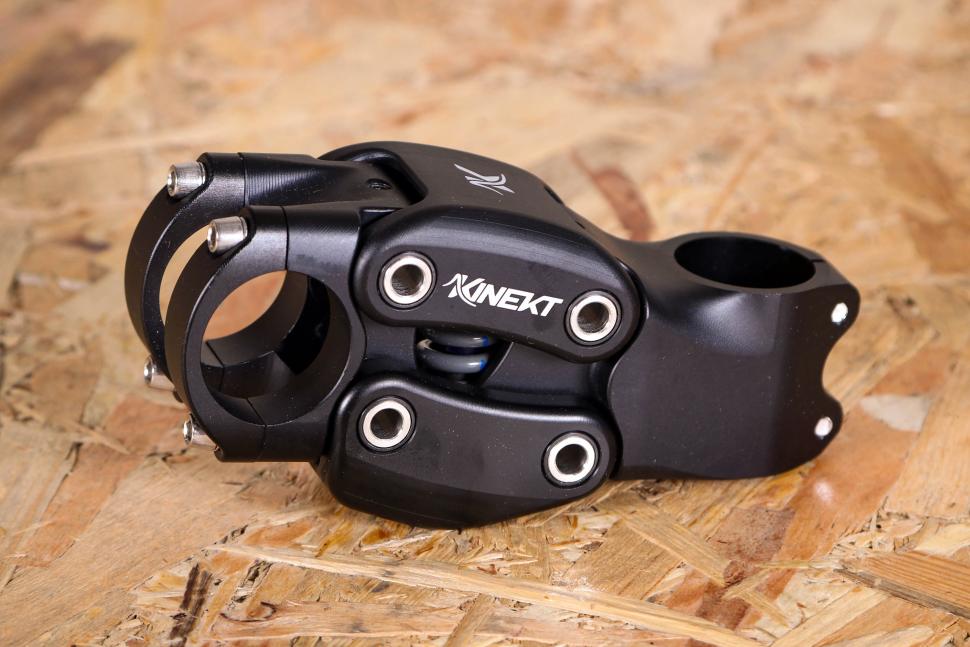
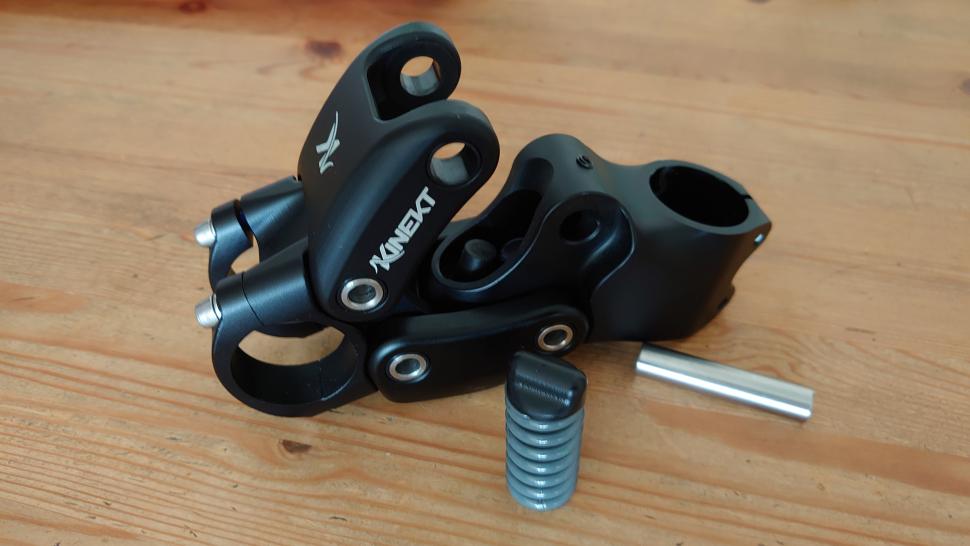
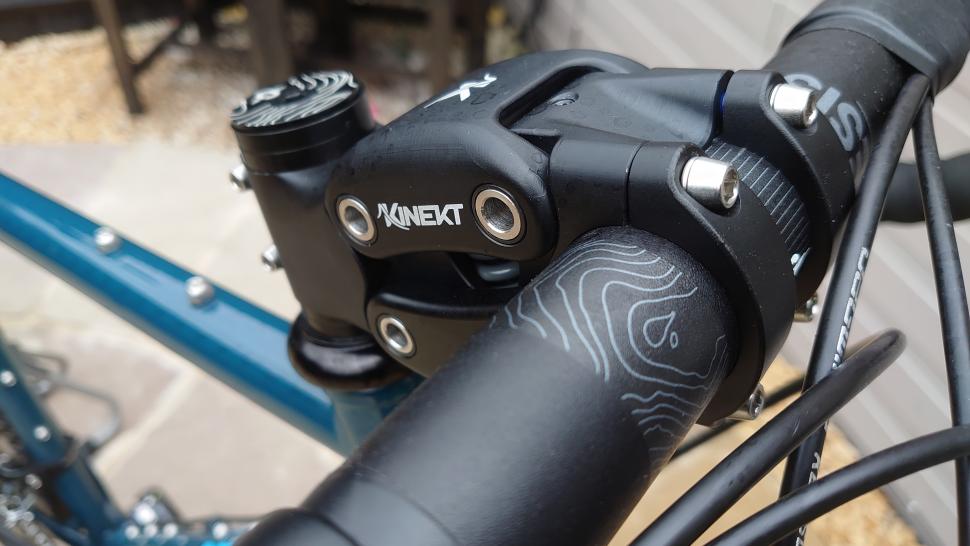

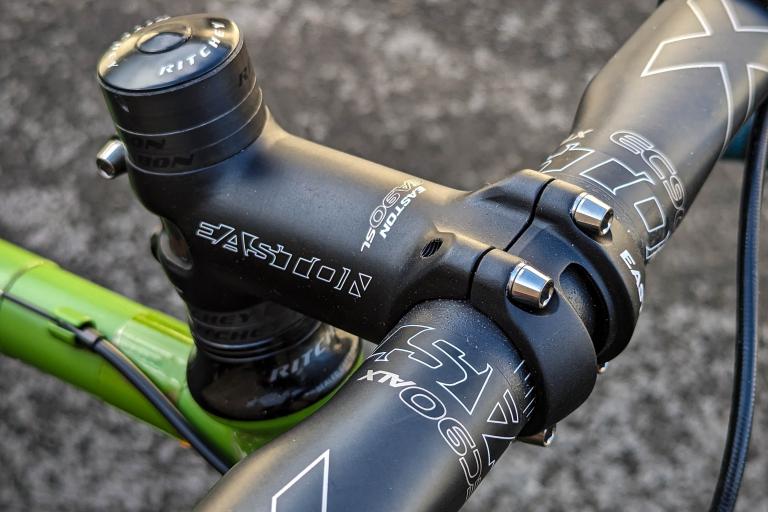
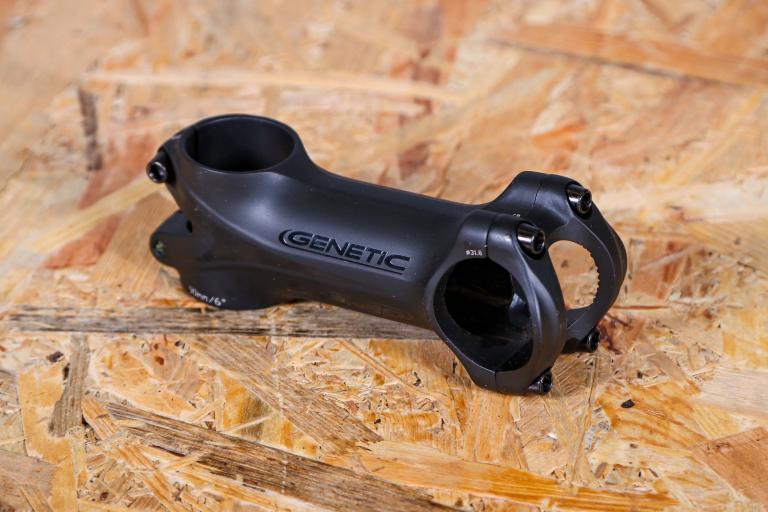
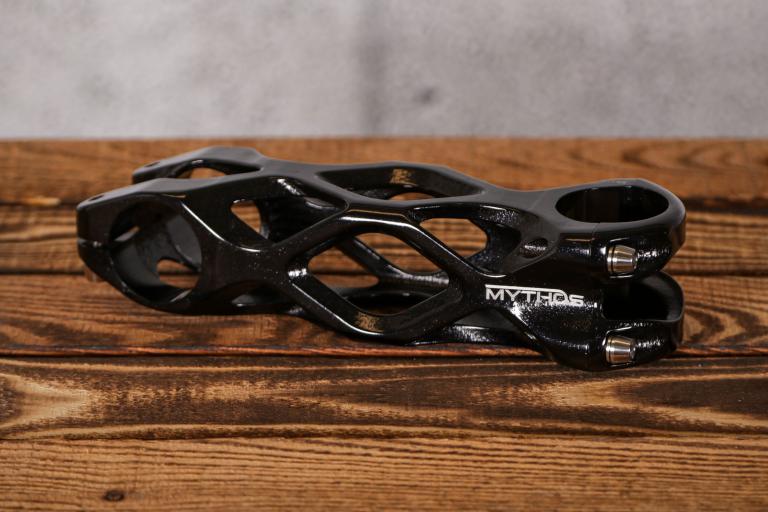
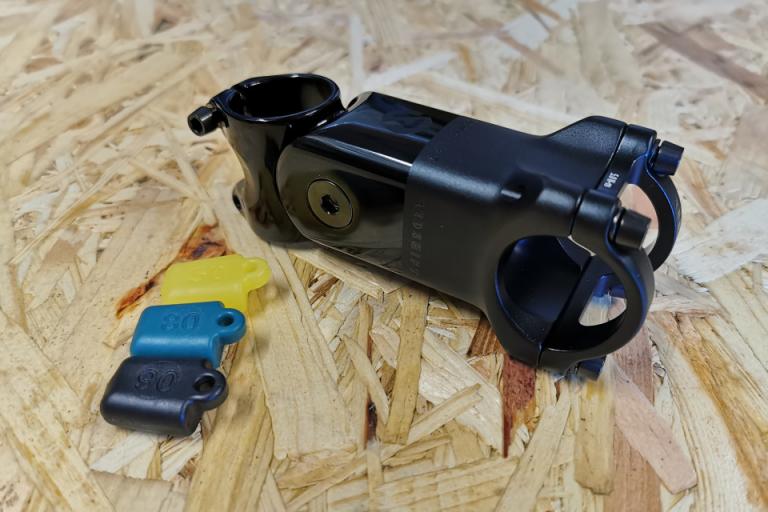
Add new comment
6 comments
It surprises me that this isn't a more crowded field, especially for the gravel and commuting markets. So I went looking for lower budget solutions, such as the Tranz-X here: https://www.sjscycles.co.uk/stems/100-tranzx-st146a2-antishock-1-18-inch...
£35, 190g in 100mm length, but looks like far less travel - more of a buzz damper than a bump tamer I guess, which is no bad thing. Would be interesting to see a review of that and any competitors.
Warming to a theme here (& it's a bit warmer than the weather), I found an academic paper (pdf) comparing a Redshift, a TranzX and a standard aluminium stem here: https://www.google.com/url?sa=t&source=web&rct=j&url=https://www.mdpi.co...
This used - by 2020 standards - narrow tyres and high pressures (23 mm and 116 psi), 77 kg rider, and showed that the TransX equated to dropping the pressure to 102 psi. The Redshift was a lot better, the equivalent being 78 psi.
Sadly I couldn't work out what the effect would be if tyres and pressures were already wider and lower. On my Al road bike, which is pretty buzzy (hence my burgeoning obsession with this) I'm on 28 mm and 70 ish psi. Any lower and a feeling of vagueness like Matt Lucas impersonating Boris Johnson comes in as the speed gets above 35 km/h (descending only, I seldom get a tailwind for that speed on the flat). The bottom of range Michelins might be a factor. So this might help a bit.
I might just ask Santa for the TranzX for Christmas and see how I get on - at £35 it seems worth a punt, and customer reviews are mostly ok.
Don't buy it, it's very heavy and I don't feel the difference (it's now sitting in my parts bin), my brother has the RedShift ShockStop and it's so much better! The only downside on the RedShift is the price and the length options!
As is the case with much in cycling cheaper isn't always better!
I wonder how this compares to a FutureShock 2.0 on a Roubaix or Diverge?
Come to think of it what happens if you put one of these or Red Shift on a FutureShock Roubaix?
A whole 40mm of travel...
I have all three on different bikes. The gravel bike is a Diverge with Future Shock 1.0 and the endurance road bike has a RedShift ShockStop stem, both of which I find to be pretty similar and happy riding either on paved or dirt roads. The Kinekt ended up on my electric cargo bike because it just doesn't feel or look right on a performance-oriented bike. I never tried adding one of the suspension stems to the Diverge because the Future Shock does a good enough job by itself. If you need more than that then you'd probably be better off with a real suspension fork.
Some clarification is needed on the versions offered. The article states "90mm, 100mm, 105mm and 120mm lengths, with an option of either a 7 degree or 13 degree angle". In fact, there are only 4 options: 90mm, 105mm and 120mm with a +7 degree angle (it cannot be used in the -7 degree orientation) and the 100mm version is the only one that comes in +30 degrees. The RedShift ShockStop stem not only gives a better ride feel, is lighter and is cheaper, it also gives more fit options, coming in 10mm increments and can be used with a positive or negative angle. If you actually measure the travel, the Kinekt stem only gives 12 mm, not the 20 mm given in the product spec's.